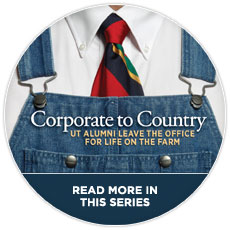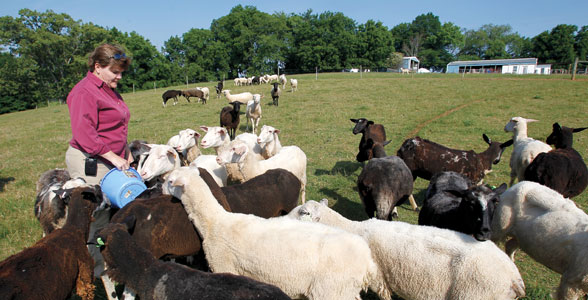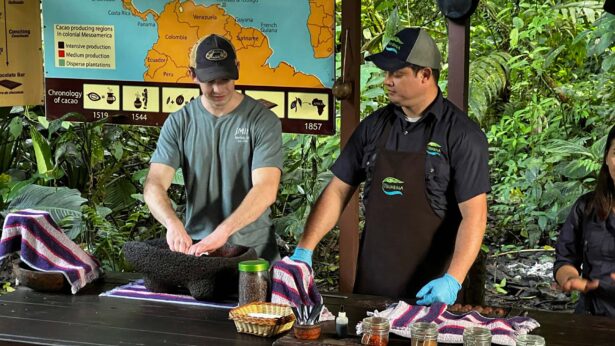By Diane Ballard
 Raising sheep is a lot like computer -science—at least in Sheri Palko’s mind. She’s done both and sees similarities in the painstaking attention to statistical detail required in software engineering and in tracking genetic markers in sheep. She analyzes every statistic about her sheep in spreadsheets, echoing the minutiae that characterized her earlier work as a software engineer.
Raising sheep is a lot like computer -science—at least in Sheri Palko’s mind. She’s done both and sees similarities in the painstaking attention to statistical detail required in software engineering and in tracking genetic markers in sheep. She analyzes every statistic about her sheep in spreadsheets, echoing the minutiae that characterized her earlier work as a software engineer.
Palko (Knoxville ’85) recently moved her sheep from leased pastures in west Knox County to a larger spread she purchased in Vonore, in Monroe County. There her plan is to have more sheep, make and sell more artisanal sheep’s milk cheeses, and dip a toe into the waters of agritourism.
Three things you should know about Palko, the sheep farmer:
1. She loves to milk sheep.
2. She’s fascinated by their genetics.
3. She hates to sell cheese.
But cheese, alas, is where the dollars come from to keep doing the things she loves. She was lucky enough to begin selling artisanal cheese just at the time the foodie world went gaga over anything made in small quantities by a skilled craftsperson. Locust Grove Farms, her brand name, sells through an internet storefront and in dozens of retail outlets, as well as at Knoxville area farmers’ markets and from the farm itself. Offerings include La Mancha, a manchego-like hard cheese; Cumberland, similar to La Mancha but with added seasonings; Gouda-like Appalachian Spring; and Clingman’s Tomme, an aged semifirm washed-rind cheese. After recently purchasing pasteurizing equipment, Palko has added soft cheese, a sheep’s milk chevre, to her offerings. Despite the unmistakable popularity of the products, Palko is so loath to sell her cheese that she’s allocated hard-earned dollars to pay her first and only full-time employee—a sales manager.
Palko, who worked as a software engineer from 1985 to 1990, got into sheep by way of dogs. During the time she was raising her family, she began training Belgian Tervuren sheep-herding dogs as a hobby. To properly train the dogs, she needed sheep. One thing led to another, and in 2006 she found herself in partnership with another sheep farmer whose ambition was to make cheese. She bought out her partner two years later but couldn’t ignore the revenue that accrues from $19-a-pound artisanal cheeses.
“So many folks these days are trying to eat healthier, eat locally, and support their local farmers,” she says. “There is a huge movement toward supporting farmsteads in the U.S., and I think that has helped our business.”
At age 48, Palko says she’s learned to work smarter, not harder. She’s invested in a tractor to move the large hay bales she used to toss by hand. She’s also reduced the number of farmers’ markets Locust Grove Farms attends from eight a week to three in favor of selling more cheese online and at the farm itself. “That’s a wiser use of my time rather than packaging and preparing for markets.”
Palko says she couldn’t see herself behind a desk for the rest of her life. “I love animals. I liked designing and writing software, but you can’t compare liking your job to doing something you’re passionate about.”
Both Palko and her husband, Leonard, share the desire to be self-sufficient. Though Leonard still works as a nuclear engineer (he’s also a UT Knoxville graduate), he and Palko want to be able to support themselves in retirement. “We love all things agriculture, and the older we’ve gotten, the more we realize that most of our needs can be met doing what we enjoy.” They have three daughters, the youngest of whom shares her mother’s passion for animals. She has her own sheep among the herd and has won 4-H prizes.
Palko’s goal at her new farm is to milk 150 ewes twice a day. She will also open a farmstead storefront, and she will throw her energies into educating visiting families and school groups.
“People have very little idea where their food comes from, and I want to help them learn,” she says. A lot of people don’t know sheep from goats, she’s observed. “If you know how to raise a garden or raise livestock, you’ll never be hungry—and that’s important.”
For more information about Palko’s farm, visit www.locustgrovefarm.net.



